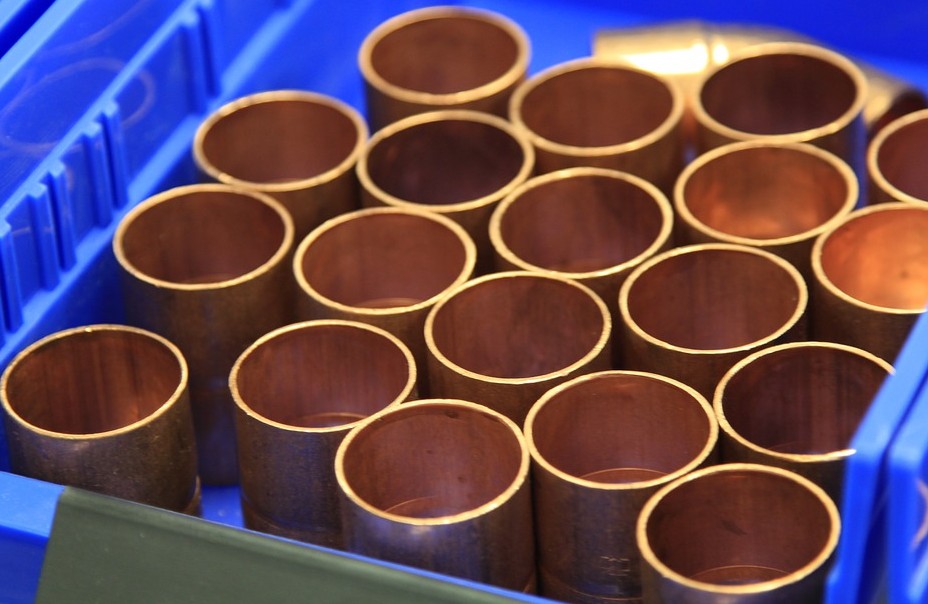Whether its in large diameters or small, for liquid or gas, for high- or low-pressure systems under a wide range of temperatures, you can depend on copper piping to reduce costs for any mechanical system. Therefore, we will discuss some of the many benefits of copper piping for mechanical systems.
Benefits of Copper Piping for Mechanical Systems
Versatility
One of the many benefits of copper piping for mechanical systems is the versatility it offers. You can use copper piping for superior performance throughout any job. It is easy to work and has great thermal conductivity, corrosion resistance and durability.
Copper is also available in two basic types of tube—plumbing tube and air condition/refrigeration (ACR) tube, and in both drawn (hard) and annealed (soft) tempers. Copper piping is also available in a variety of diameters and wall thicknesses.
Variety of Applications
Copper piping today has proven superior for the following applications:
- Underground water and gas services
- Water distribution systems
- Chilled water mains
- Drainage and vent systems
- Heating systems (including solar)
- Fuel-oil systems
- Oxygen systems
- Non-flammable medical-gas systems
Wide Range of Sizes
Whether its a large or small diameter, there is a copper pipe to fit every specification. Forced-circulation hot water heating systems utilize small and economical pipe sizes with soldered joints and require less space for installation.
Joined by soldering or brazing, large-diameter is cost-effective for water distribution and for fire-protection risers in multistory buildings. The superior hydraulic-flow characteristics of copper permits precis tube and pump sizing.
Problem-Free Performance
It is good engineering practice to utilize one material for all components throughout a mechanical system.
The more copper utilized in an installation, the more you can rely on dependable performance. This material is popular for its reliability.
Long Lasting and Maintenance Free
Copper piping has withstood the test of time to earn customer satisfaction and wide code acceptance. It has been used for centuries and has gained new popularity in its modern form: light, strong, corrosion-resistant tube. Copper has become the leading choice for plumbing, heating cooling and other mechanical systems. This is because of its long-lasting and maintenance-free characteristics. This material never requires painting for protection from corrosion.
Additionally, a thin film forms inside the tube, which provides natural protection from corrosion. The universal acceptability of copper assures compliance with major business codes as well. Copper piping is also safe and will not burn or support combustion. Therefore, it will not carry fire through floors, walls and ceilings, and it will not decompose into toxic gases.
Corrosion Resistance
The excellent corrosion resistance of copper piping is a crucial reason for its choice in so many application. For instance, solar energy systems benefit from copper’s resistance to both atmospheric and aqueous corrosion. The copper tube’s internal corrosion resistance for water distribution and fire sprinkler systems results in superior flow capacity.
When calculating flow capacities, other plumbing materials require additional allowances for corrosion, scaling, out-of-roundness and smaller internal diameter when compared size-to-size with copper. Copper piping remains smooth, and internal diameters stay constant. As a result of this, a copper fire sprinkler system can utilize smaller diameters to provide the same sprinkler coverage as a steel system—with immense savings in installed costs.
High Thermal Conductivity
Copper conducts heat up to eight times better than other metals. In any application involving heat transfer—from radiant heating to snow melting to direct exchange, geothermal pump systems—the high thermal conductivity of copper provides an advantage.
When comparing copper, aluminum and steel, copper is significantly the best conductor of heat. In solar energy systems, the superior thermal conductivity of copper allows the thinner copper sheet to collect the same heat as a much thicker-gauge sheet of aluminum or steel.
These are just a few of the many benefits of copper piping for mechanical systems. Contact Bryan Hose & Gasket with the link below for more information!

